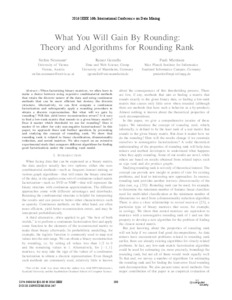|
What you will gain by rounding : theory and algorithms for rounding rank
Neumann, Stefan
;
Gemulla, Rainer
;
Miettinen, Pauli
![[img]](https://madoc.bib.uni-mannheim.de/42465/1.hassmallThumbnailVersion/What%20You%20Will%20Gain%20By%20Rounding%20Theory%20and%20Algorithms%20for%20Rounding%20Rank.pdf)  Vorschau |
|
PDF
What You Will Gain By Rounding Theory and Algorithms for Rounding Rank.pdf
- Veröffentlichte Version
Download (384kB)
|
|
DOI:
|
https://doi.org/10.1109/ICDM.2016.0049
|
|
URL:
|
https://madoc.bib.uni-mannheim.de/42465
|
|
Weitere URL:
|
http://dws.informatik.uni-mannheim.de/fileadmin/le...
|
|
URN:
|
urn:nbn:de:bsz:180-madoc-424650
|
|
Dokumenttyp:
|
Konferenzveröffentlichung
|
|
Erscheinungsjahr:
|
2016
|
|
Buchtitel:
|
16th IEEE International Conference on Data Mining : 12-15 December 2016, Barcelona, Catalonia, Spain : proceedings
|
|
Seitenbereich:
|
380-389
|
|
Veranstaltungstitel:
|
16th International Conference on Data Mining (ICDM)
|
|
Veranstaltungsort:
|
Barcelona, Spain
|
|
Veranstaltungsdatum:
|
12-15 Dec. 2016
|
|
Herausgeber:
|
Bonchi, Francesco
|
|
Ort der Veröffentlichung:
|
Piscataway, NJ
|
|
Verlag:
|
IEEE
|
|
ISBN:
|
978-1-5090-5474-9 , 978-1-5090-5472-5 , 978-1-5090-5473-2
|
|
ISSN:
|
2374-8486
|
|
Sprache der Veröffentlichung:
|
Englisch
|
|
Einrichtung:
|
Fakultät für Wirtschaftsinformatik und Wirtschaftsmathematik > Practical Computer Science I: Data Analytics (Gemulla 2014-)
|
|
Fachgebiet:
|
004 Informatik
|
|
Abstract:
|
When factorizing binary matrices, we often have to make a choice between using expensive combinatorial methods
that retain the discrete nature of the data and using continuous methods that can be more efficient but destroy the discrete structure. Alternatively, we can first compute a continuous factorization and subsequently apply a rounding procedure to obtain a discrete representation. But what will we gain by rounding? Will this yield lower reconstruction errors? Is it easy
to find a low-rank matrix that rounds to a given binary matrix? Does it matter which threshold we use for rounding? Does it
matter if we allow for only non-negative factorizations? In this paper, we approach these and further questions by presenting
and studying the concept of rounding rank. We show that rounding rank is related to linear classification, dimensionality
reduction, and nested matrices. We also report on an extensive experimental study that compares different algorithms for finding good factorizations under the rounding rank model.
|
 | Dieser Eintrag ist Teil der Universitätsbibliographie. |
 | Das Dokument wird vom Publikationsserver der Universitätsbibliothek Mannheim bereitgestellt. |
 Suche Autoren in Suche Autoren in
BASE:
Neumann, Stefan
;
Gemulla, Rainer
;
Miettinen, Pauli
Google Scholar:
Neumann, Stefan
;
Gemulla, Rainer
;
Miettinen, Pauli
ORCID:
Neumann, Stefan, Gemulla, Rainer  ORCID: https://orcid.org/0000-0003-2762-0050 ORCID: https://orcid.org/0000-0003-2762-0050 and Miettinen, Pauli
Sie haben einen Fehler gefunden? Teilen Sie uns Ihren Korrekturwunsch bitte hier mit: E-Mail
Actions (login required)
 |
Eintrag anzeigen |
|
|
 ORCID: https://orcid.org/0000-0003-2762-0050 and Miettinen, Pauli
ORCID: https://orcid.org/0000-0003-2762-0050 and Miettinen, Pauli



 Suche Autoren in
Suche Autoren in